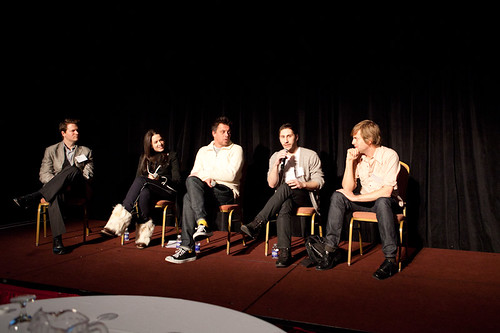
Hangover remedies shared by @SandraOldfield
“I do hereby firmly resolve…” Each year as a child I wrote these words on New Years Eve. There was an uncomfortable gravitas that came with putting my resolutions down on paper, sitting in the living room with my parents, my brother, my sister, knowing full well that we would all be expected to share our resolutions aloud. Knowing full well that some of my inked goals were not new, were repeats from a year prior (and perhaps the year before that and so on.) In other words, some new years resolutions represented failures. By reaffirming that I would undertake what I had failed required humility and honesty. It also created optimism and hope. I had failed, but now I would succeed.
“I do firmly resolve…” That’s powerful language. A powerful act.
As an adult the gravitas diminished. Over time I abandoned much of the soul searching and honesty of defining and sharing specific, personal, intentional, meaningful resolutions. Toasts and lighthearted bravado eclipsed reflection and goal setting. Champagne, dancing, singing, hugs and kisses and thumps on the back. Each year I still try to jot down a few goals in my Blackberry to refer to over the course of a year, but the ritual of my childhood definitely lapsed.
Until this morning. I awoke knowing that something was missing. It was time to plant my keister at the honesty table for a little tough love. Did I rock 2010 the way I could have? Did I seize the most important opportunities? Did I achieve or significantly progress toward my goals? Have some of my goals changed? Is it time to weed out longstanding ambitions that perhaps no longer matter and replace them with new ones that do?
Before long my reflection yielded to hopes and plans for the new year. I scrawled out two pages of changes, improvements, goals and accomplishments for 2011, and then I massaged them into a prioritized, categorized layout. An action plan.
I felt pretty good.
But it’s easy to feel good writing lists, dreaming of what we want to achieve. Easy and often fleeting. The gravitas was still missing. The accountability. The humility and honesty that resulted from speaking my resolutions aloud as a boy. From owning and sharing and responding to questions and making a public commitment. “I do firmly resolve…”
Having dropped my parents off at the airport yesterday afternoon to fly home to Chicago, and since my siblings are far, far away, the tried and true ingredients for resolution gravitas were absent. Time for new ingredients. Time for reinvention!
Here’s what I’ve decided. I’m going to share a few resolutions with you to see if there’s gravitas to be had. To see if forging a compact with my virtual family can help me keep my 2011 resolutions. Don’t worry, I’m not going to swamp you with two pages of “Take the dog on more adventures” and “Share better wine with more friends” and “Go fly fishing!”
Like everyone else, I’ve pledged to supersize my fitness regimens. Yes, both of them!
Just as physical activity is essential to maintaining a healthy body, challenging one’s brain, keeping it active, engaged, flexible and playful, is not only fun. It is essential to cognitive fitness. (This Year, Change Your Mind)
Now that the holidays are fading in the rearview mirror, I’ll be more successful at dealing with the decadent dining dilemma: downsize, downsize, downsize! There are work resolutions (Drupal, Drupal, Drupal) and personal resolutions (gardening, orcharding and timely thank you notes) too, but it’s my bookish resolutions that I need to affirm publicly (“One thing only needs your attention…“) so that you can bust my chops when I get distracted, discouraged and/or delusional.
That’s right. Part of effective New Years Resolutioning is going on the record and proclaiming your goals openly so that others can help you monitor your progress and ultimately succeed. You in? Thanks.
My #1 resolution for 2011 is to deliver Rosslyn Redux to its audience:
- to publish the print memoir and the ebook;
- to record and distribute the audio book;
- to publish the video series;
- to perform the one-man show;
- and to share my quixotic publishing adventure with you as I move toward my goal.
Whiplash? Thwappp! It’s real. It’s happening. It’s now. And I’m going to take you along for the ride via twitter, video, blogging, storify and [hopefully soon] broadcastr. A glimpse inside the adventure of a newbie writer courting a publishing industry doing the funky chicken in time lapse animation. You with me? Hang in there. Things are liable to get even more confusing in the months ahead, but we’ll muddle through. And laugh at ourselves plenty along the way.
Did you read 37 literary resolutions for 2011? I liked Janet Fitch’s marginalia ambitions:
My book-related resolution for 2011: To converse more with my books. To write in the margins. (37 literary resolutions for 2011. What’s yours?)
As I plunge head over heels into an exotic publishing adventure, I’m going to chronicle the conversations along the way. I’m going to write in the margins. And I’m going to share my marginalia with you. In fact, I’ve already started… I hope you’ll help keep me honest, focused and determined. And I hope you’ll bust my chops when I get distracted, discouraged and/or delusional. Thank you!
I do hereby firmly resolve to publish Rosslyn Redux in multiple formats and to share my experiences over the next year while moving toward this goal. Gravitas!
Like this:
Like Loading...












